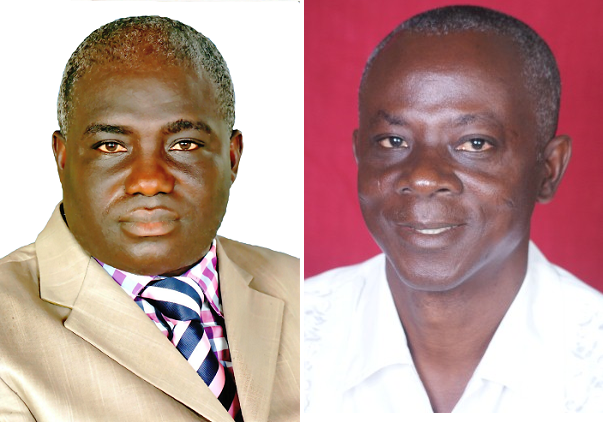
The Asunafo South swing; who wins 2016 parliamentary election?
Asunafo South has been a swing constituency since the country returned to constitutional rule in 1992.
Unlike other constituencies which have been safe seats for either the New Patriotic Party (NPP) or the National Democratic Congress (NDC), the constituency has been a hot battle ground for both parties in every election year.
The two protagonists involved in this struggle for some time now are the current Brong Ahafo Regional Minister and incumbent Member of Parliament (MP), Mr Eric Opoku, and former MP, Mr George Yaw Boakye of the NPP.
While Mr Opoku occupied the seat and lost it to Mr Boakye, he regained the seat during the 2012 election.
It is, therefore, expected that while Mr Boakye will fight tooth and nail to recapture the seat, Mr Opoku will also do what he can to retain the seat during the December polls.
Supporters of the two candidates have faith in their candidates winning the upcoming parliamentary election and have been working around the clock to support them.
‘Nobody will use his or her left hand to point to his village,’ so says an Akan proverb and that is exactly what supporters of both the NDC and the NPP are exhibiting in the constituency.
NDC supporters in the constituency are sure that Mr Opoku will “retain the seat even with a wider margin” with an explanation that he had helped to bring about infrastructural development which they claimed had had a positive impact on the lives of the people.
“The NDC is a party of our choice and we will work hard to ensure that our preferred candidate, Mr Opoku, who has proven to be reliable and capable, retains the seat,” one of his supporters told the Daily Graphic at Kukuom.
However, NPP supporters in the constituency will not admit this assertion claiming that Mr Boakye proved to be a capable person who also brought a lot of development to the districts during his tenure as district chief executive and MP.
Constituency profile
The Asunafo South District was created when former President John Agyekum Kufuor signed the instrument on November 12, 2013, to create 19 more districts.
However, the Asunafo South Constituency, which is also the same as the Asunafo South District, was among the original 200 constituencies which began the Fourth Republic.
Apart from Kukuom, which is the district capital, other major settlements in the constituency include Sankore, Abuom, Anwiam, Camp No 1, Dantano, Kwapong, Nobekaw, Asarekrom, Nakete and Kokooso.
Population
The 2010 Population and Housing Census puts the population of the Asunafo South Constituency at 95,580 comprising 48.9 per cent males and 51.1 per cent females. About 74.3 per cent of the district’s population live in rural localities.
According to figures, the number of people who are 11 years and above, 70.7 per cent are literate while 29.3 are non-literate.
Economy
About 79.1 per cent of the population aged 15 years and above are economically active while 20.1 per cent are not economically active.
In addition, about 74.2 per cent of the employed population are engaged in skilled agriculture, forestry and fishing, 9.1 per cent in service and sales, 6.6 per cent in craft and related trade and 5.1 per cent engaged as managers, professionals and technicians.
Furthermore, as high as 85 per cent of households in the constituency are engaged in agriculture with most households (98.7 per cent) involved in crop farming, while poultry (chicken) is the dominant animal reared in the district.
2008 and 2012 elections
Even though the NPP’s Mr George Boakye won the seat in 2008, it was a close contest between him and Mr Opoku who fought gallantly in his bid to recapture his lost seat.
In that election, Mr Boakye had 16,574 votes (50.30 per cent) out of the total votes cast of 33,502 with voter turnout of 75.86 per cent, Mr Opoku followed closely with 15,921 votes, representing 48.31 per cent of the total votes cast.
Thus Mr Boakye defeated Mr Opoku by 653 votes to win the seat in that closely fought election.
The other two candidates who contested the seat were Yusif Kanani of the People’s National Convention (PNC), who had 317 votes (0.96 per cent), and Vincent Adu-Gyamfi of the Democratic People’s Party (DFP), who garnered only 141 votes (0.43 per cent).
However, things changed for the better for Mr Opoku during the 2012 general election when he dethroned his rival with 21,770 votes, representing 53.04 per cent of the total votes cast (41,633).
In that election, Mr Boakye got 18,995 votes, representing 46.28 per cent, while two other contestants, Mohammed Boakye-Boadu of the Progressive People’s Party (PPP) and Acheampong Joseph of the National Democratic Party (NDP), had 214 (0.52 per cent) and 64 (0.16) votes respectively.
The turnout in the 2012 election was 88.92 per cent which was an improvement on that of the 2008 polls, which was 75.86 per cent.
The above analysis indicates that there was a difference of 8,131 votes between the total votes cast in 2008 and the total votes cast in 2012.
While the NPP’s Mr Boakye had his results in 2008 reduced from 50.3 per cent of the total votes cast to 46.28 per cent in 2012, Mr Opoku had his results in 2008 increased from 48.31 per cent to 53.04 per cent of the total votes cast.
A lot is, therefore, at stake during the December 2016 polls as each candidate will try to outdo the other.
The recent limited registration exercise in the constituency was a test of the importance the two candidates attach to the upcoming election. During the exercise, there were reports of violence with some prospective voters being prevented from registering.
Such is the situation in the Asunafo South Constituency where candidates cannot be sure of their fate until the results of elections are declared.
Writer’s email:
